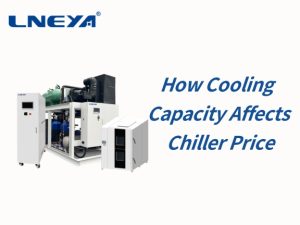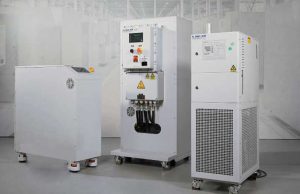Ion implantation chillers in semiconductor manufacturing processes
Ion implantation is an important step in semiconductor manufacturing processes to precisely dope and control the electrical properties of semiconductor materials by implanting high-energy ions into them. This process generates a lot of heat, so chillers are needed to achieve the following goals. The temperature requirements of the chillers used in the ion implantation process are set according to the specific operating conditions of the ion implantation equipment and the characteristics of the semiconductor materials being processed. Although the specific temperature setting value may vary depending on the equipment model, process flow and the doping effect sought, in general, the chiller needs to be able to provide stable low-temperature cooling to maintain the temperature of key components in the ion implantation equipment within a precise and narrow range.

Temperature Range: The chiller is generally required to be able to provide cooling capacity from ambient temperature to approximately -20°C or even lower, depending on the heat generated during the ion implantation process and the cooling requirements of the equipment. For some high-end or special applications, lower temperature control capabilities may be required.
Temperature Stability: Temperature stability is extremely critical during the ion implantation process. The chiller needs to be able to maintain the set temperature fluctuation between ±0.1℃ and ±1℃ to ensure accurate control and repeatability of the implantation process.
Fast Response: The rapid temperature change during ion implantation requires the chiller to have a fast response capability, and to be able to quickly adjust the cooling output to adapt to changes in process requirements to avoid temperature exceeding the control range.
Cooling Uniformity: The chiller also needs to ensure that the temperature of the coolant is uniform during the circulation process to avoid local overcooling or overheating, which is very important for maintaining the consistency of the internal temperature of the equipment.
Intelligent Control: Modern ion implantation chillers are usually integrated with advanced temperature control and monitoring systems, such as PID controllers, which can automatically adjust the cooling output to respond to real-time temperature changes and ensure constant cooling effect.
In summary, the temperature requirements of ion implantation chillers in semiconductor manufacturing processes emphasize low temperature, high stability and fast response capabilities, aiming to create a highly controllable temperature environment for the ion implantation process, thereby ensuring the accuracy of doping and the performance of semiconductor devices.
SemiocnductorProcess Chillers
- Details
FLT-100℃~90℃
Single channel air-cooled cooler, mainly designed for etching machines. It is used to provide independent temperature control for the chamber sid…
- Details
FLTZ -45℃~90℃
Heating method within 40 ℃ adopts a compressor hot gas heating fully enclosed design, and the machine operates continuously for 24 hours The semiconductor temperature control device Chiller is mainly used for p…
loading…
已经是到最后一篇内容了!
Related recommendations
-
Semiconductor Chiller Applications in Modern Wafer fabrication
1535Discover how chillers ensure precise temperature control in wafer fabs. Learn key applications in lithography, etching, CMP, and more.
View details -
How Cooling Capacity Affects Chiller Price
712Learn how chiller cooling capacity affects price. Discover why larger chillers cost more and how to choose the right size for your process.
View details -
What Is a Chemical Process Chiller
1056Reliable Chemical Process Chillers ensure stable reactions, protect equipment, cut energy use, and improve safety in demanding chemical plants.
View details -
Semiconductor Chillers in Chip Testing
1398Semiconductor chillers ensure precise temperature control in chip testing, improving reliability, reducing failures, and protecting wafer quality.
View details
 LNEYA Industrial Chillers Manufacturer Supplier
LNEYA Industrial Chillers Manufacturer Supplier














